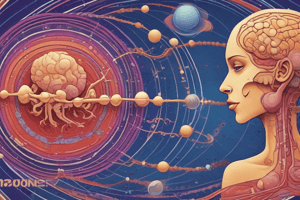Podcast
Questions and Answers
Which type of hormone is derived from cholesterol and is lipophilic?
Which type of hormone is derived from cholesterol and is lipophilic?
- Amino acid-derived hormones
- Gaseous hormones
- Steroid hormones (correct)
- Peptide hormones
What type of hormones are water-soluble and made of amino acids?
What type of hormones are water-soluble and made of amino acids?
- Amino acid-derived hormones
- Gaseous hormones
- Steroid hormones
- Peptide hormones (correct)
Which hormone is derived from the amino acid tyrosine and regulates metabolism?
Which hormone is derived from the amino acid tyrosine and regulates metabolism?
- Testosterone
- Insulin
- Nitric oxide
- Thyroxine (T4) (correct)
What are gasotransmitters also known as?
What are gasotransmitters also known as?
Which group of animal hormones requires specific receptors to exert their effects?
Which group of animal hormones requires specific receptors to exert their effects?
What is the Greek meaning of the term 'hormone'?
What is the Greek meaning of the term 'hormone'?
Which hormones are crucial for growth and development in animals?
Which hormones are crucial for growth and development in animals?
Where are insulin-like growth factors (IGFs) produced in animals?
Where are insulin-like growth factors (IGFs) produced in animals?
Which hormone is responsible for regulating metabolism, body temperature, and energy production?
Which hormone is responsible for regulating metabolism, body temperature, and energy production?
Which hormones regulate the digestion and absorption of food in the gastrointestinal tract?
Which hormones regulate the digestion and absorption of food in the gastrointestinal tract?
Which hormone is essential for maintaining male secondary sexual characteristics and sperm production?
Which hormone is essential for maintaining male secondary sexual characteristics and sperm production?
What is the primary hormone that regulates blood sugar levels by promoting glucose uptake and storage in cells?
What is the primary hormone that regulates blood sugar levels by promoting glucose uptake and storage in cells?
Study Notes
Animal Hormones: Regulatory Molecules Shaping Life
The term "hormone" originates from the Greek word "hormon," which means to excite or set in motion. In animals, these molecules play a vital role in regulating various life processes, from growth and development to behavior and reproduction. Here, we'll delve into the world of animal hormones, exploring their types and functions.
Types of Animal Hormones
Animal hormones can be categorized into several major groups:
-
Steroid hormones: Derived from cholesterol, steroid hormones are lipophilic (fat-soluble) and can pass through cell membranes. Examples include testosterone, estrogen, progesterone, and cortisol.
-
Peptide hormones: Made of amino acids, peptide hormones are water-soluble and require specific receptors to exert their effects. Examples include insulin, glucagon, growth hormone, and oxytocin.
-
Amino acid-derived hormones: These hormones are derived from specific amino acids but are not peptides. Examples include thyroxine (T4) and triiodothyronine (T3), which are derived from the amino acid tyrosine and regulate metabolism.
-
Gaseous hormones: Also known as gasotransmitters, these hormones are gases, such as nitric oxide and carbon monoxide, that act as signaling molecules, particularly in controlling blood flow.
Animal Hormones and Their Functions
Numerous hormones play essential roles in various aspects of animal life.
1. Growth and Development
Growth hormone (GH) and insulin-like growth factors (IGFs) are crucial for growth and development in animals. They stimulate the growth of bones, muscles, and internal organs. Growth hormone is synthesized and released by the anterior pituitary gland, whereas IGFs are produced in the liver and other tissues in response to GH.
2. Metabolism
Thyroid hormones, such as T3 and T4, are responsible for regulating metabolism, body temperature, and energy production. They are synthesized and released by the thyroid gland, a butterfly-shaped gland located in the neck.
3. Digestion and Absorption
Hormones, such as gastrin, secretin, and cholecystokinin, regulate the digestion and absorption of food in the gastrointestinal tract. These hormones are released in response to the presence of specific nutrients and help to coordinate the mechanical and chemical breakdown of food and the absorption of nutrients.
4. Reproduction
Reproductive hormones, such as estrogen, progesterone, testosterone, and luteinizing hormone (LH), regulate the reproductive cycle and facilitate the development of sex organs. In females, estrogen and progesterone regulate the menstrual cycle and prepare the body for pregnancy. Testosterone is essential for maintaining male secondary sexual characteristics and sperm production. LH is produced by the anterior pituitary gland and triggers the release of sex hormones from the gonads (ovaries or testes).
5. Water and Electrolyte Balance
Antidiuretic hormone (ADH) and aldosterone are essential for maintaining water and electrolyte balance in the body. ADH is produced in the hypothalamus and released into the bloodstream by the posterior pituitary gland, while aldosterone is produced by the adrenal cortex. Both hormones help to regulate the amount of water and electrolytes excreted by the kidneys.
6. Blood Sugar Regulation
Insulin and glucagon are the primary hormones that regulate blood sugar levels. Insulin is produced by the pancreas and promotes the uptake and storage of glucose in cells, while glucagon is produced by the pancreas and stimulates the liver to break down glycogen and release glucose into the bloodstream.
7. Stress Response
The hypothalamic-pituitary-adrenal (HPA) axis is activated during stressful situations, leading to the release of cortisol, which helps the body to cope with stress. Cortisol has numerous effects, including increasing blood sugar levels, suppressing the immune system, and promoting fat storage.
To summarize, animal hormones play a vital role in regulating essential life processes, such as growth and development, metabolism, reproduction, water and electrolyte balance, blood sugar regulation, and stress response. These hormones ensure proper functioning and coordination of various body systems, allowing animals to adapt to their environment and survive.
Studying That Suits You
Use AI to generate personalized quizzes and flashcards to suit your learning preferences.
Description
Explore the world of animal hormones and their vital role in regulating growth, development, metabolism, reproduction, digestion, and more. Learn about the different types of animal hormones and how they shape various life processes.




